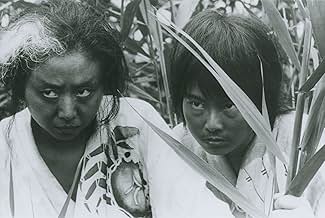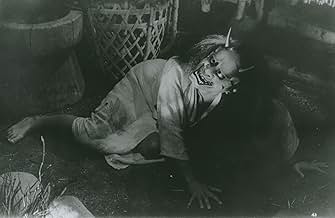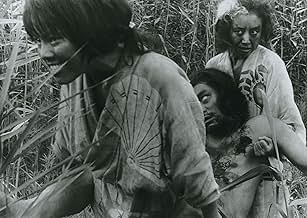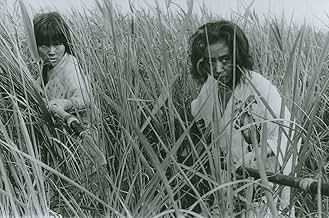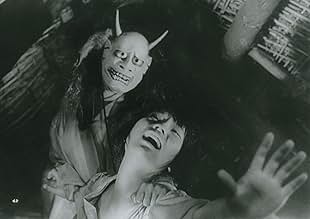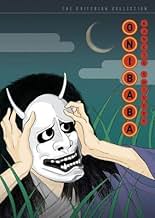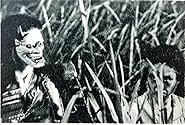Two women kill samurai and sell their belongings for a living. While one of them is having an affair with their neighbor, the other woman meets a mysterious samurai wearing a bizarre mask.Two women kill samurai and sell their belongings for a living. While one of them is having an affair with their neighbor, the other woman meets a mysterious samurai wearing a bizarre mask.Two women kill samurai and sell their belongings for a living. While one of them is having an affair with their neighbor, the other woman meets a mysterious samurai wearing a bizarre mask.
- Awards
- 2 wins total
- Director
- Writer
- All cast & crew
- Production, box office & more at IMDbPro
7.825K
1
2
3
4
5
6
7
8
9
10
Featured reviews
The Labyrinth of the Long Grass...
Life's been tough, and you're surviving on the edge, trapping Samurai from flows in which you dredge, your often empty skillet, is sometimes, filled with millet, but at least your daughter in law helps you fetch. A neighbour returns home, with some bad news, your son, fallen in battle, no longer moves, it's not long before his wife, is causing stress, struggle and strife, behaving in a way you wholly disapprove. By fortune, you obtain a Hannya Mask, it comes in handy for a demonising task, a barrier of sorts, daughter in law's trips cut short, but there's no time to enjoy pleasures, or to bask.
Nobuko Otowa provides us with a truly outstanding performance as she grapples with her daughter in law's infidelity after the loss of her husband, leaving her isolated, alone and forgotten. The cinematography is sublime, the raw emotions unrefined, and the mask a cursed damnation that sticks and binds.
Nobuko Otowa provides us with a truly outstanding performance as she grapples with her daughter in law's infidelity after the loss of her husband, leaving her isolated, alone and forgotten. The cinematography is sublime, the raw emotions unrefined, and the mask a cursed damnation that sticks and binds.
An absolutely amazing piece of poetry
To describe this film in one word, that word would have to 'wow', or something to that effect. In short, Onibaba is an absolutely spectacular cinematic spectacle, and one that has few equals in it's field. In fact, it's the perfect fusion between art-house cinema and atmospheric horror! Loosely based on a Buddhist fable, Onibaba tells a story of lust, envy, wrath and betrayal which is wrapped up by way of a hideous demon mask. Onibaba is a human drama before it's a horror movie - all the character actions are driven by their various needs and wants, and the all the comeuppance emancipates from there. The characters and their actions are constantly fascinating, and it's that which predominantly keeps the film alive. We follow a mother and her daughter-in-law; a couple that are forced to eke out an existence in war torn Japan by killing passing samurai's and selling their belongings for food. Their existence is upset one day, however, when the son's friend, Hachi, returns from the war to the place where the two women live.
The title of the film roughly translates into English as 'demon woman', and that is an apt title for this story. Although the film doesn't contain any actual demons or other mythical creatures, the real horror comes from the character actions and the film succeeds as a horror film in that way. The atmospheric location, which consists of a huge area covered in reeds, adds weight to film's claim to the horror genre also and the location provides a truly stunning set for this story to take place. The film also features a dark pit, which the women use to dump the bodies of the Samurai they kill, which adds to the fantasy and inventive element of the story. The film is cinematic poetry on many levels, from the bleak yet beautiful cinematography, to the elements of the location mentioned - all the way down to it's central piece of imagery - the mask itself. The mask is the film's centrepiece, and the part's where it features are the most memorable of the movie.
Prolific Japanese director Kaneto Shindô takes us on a tour-de-force of atmospheric direction. He spends a fair amount of time focusing on the reeds blowing in the wind and many of his angles focus on the sky, which will no doubt irritate the less adept viewers amongst us - but the rest of us know that this is a way for Shindô to aptly portray his setting, and every instance when he did that was a delight for yours truly. There are many great shots in this movie, and if you're a fan of technical prowess, Onibaba is your film; and even if you're not, this film is a must see.
The title of the film roughly translates into English as 'demon woman', and that is an apt title for this story. Although the film doesn't contain any actual demons or other mythical creatures, the real horror comes from the character actions and the film succeeds as a horror film in that way. The atmospheric location, which consists of a huge area covered in reeds, adds weight to film's claim to the horror genre also and the location provides a truly stunning set for this story to take place. The film also features a dark pit, which the women use to dump the bodies of the Samurai they kill, which adds to the fantasy and inventive element of the story. The film is cinematic poetry on many levels, from the bleak yet beautiful cinematography, to the elements of the location mentioned - all the way down to it's central piece of imagery - the mask itself. The mask is the film's centrepiece, and the part's where it features are the most memorable of the movie.
Prolific Japanese director Kaneto Shindô takes us on a tour-de-force of atmospheric direction. He spends a fair amount of time focusing on the reeds blowing in the wind and many of his angles focus on the sky, which will no doubt irritate the less adept viewers amongst us - but the rest of us know that this is a way for Shindô to aptly portray his setting, and every instance when he did that was a delight for yours truly. There are many great shots in this movie, and if you're a fan of technical prowess, Onibaba is your film; and even if you're not, this film is a must see.
Down in a hole.
"Battle not with monsters, lest ye become a monster, and if you gaze into the abyss, the abyss gazes also into you."
The characters in Onibaba dwell in the bottom rung of Maslow's Pyramid.
Food, sex, shelter, survival - though not necessarily in that order.
Sexuality permeates every frame of this film. It is ever-present along with the oppressive heat and the marshland weeds.
The stark black and white cinematography perfectly captures the desolate mood.
The score – atonal free jazz backed by tribal rhythms - though completely anachronistic works surprisingly well.
One of the most fiercely primal depictions of the human condition on celluloid, Onibaba is a hauntingly erotic masterpiece.
- Nietzsche
The characters in Onibaba dwell in the bottom rung of Maslow's Pyramid.
Food, sex, shelter, survival - though not necessarily in that order.
Sexuality permeates every frame of this film. It is ever-present along with the oppressive heat and the marshland weeds.
The stark black and white cinematography perfectly captures the desolate mood.
The score – atonal free jazz backed by tribal rhythms - though completely anachronistic works surprisingly well.
One of the most fiercely primal depictions of the human condition on celluloid, Onibaba is a hauntingly erotic masterpiece.
solid rural horror fantasy
Director Kaneto Shindo's ONIBABA is a fantastic, rich, atmospheric horror film set in an amazing rural location. Its influence on decades of rural-set genre pics is undeniable.
In a medieval, warring Japan, a wild, young woman and her mother-in-law rob and kill lost samurai in order to survive. Problems begin when the younger woman becomes involved with an intended victim.
Staged in a rural world of tall, swaying grass and swollen rivers, the film contains little dialogue and little exposition. It relies heavily on the non-verbal performances of the female leads and the superbly conveyed location.
It is erotic, creepy, sensual, savage and beautiful.
Cinematic poetry.
In a medieval, warring Japan, a wild, young woman and her mother-in-law rob and kill lost samurai in order to survive. Problems begin when the younger woman becomes involved with an intended victim.
Staged in a rural world of tall, swaying grass and swollen rivers, the film contains little dialogue and little exposition. It relies heavily on the non-verbal performances of the female leads and the superbly conveyed location.
It is erotic, creepy, sensual, savage and beautiful.
Cinematic poetry.
Sexual tension run amok in feudal Japan
Set during a very dark time of war,where weapons and food are the items of barter due to their scarceness, which sees two different Emperors on the throne of Japan and Kyoto destroyed by fire
.our story is that of a Mother and her Daughterin-law who have been left on their own to fend for themselves while the son/husband of our main protagonists is away at war
.The Mother and daughter duo take care of themselves by killing any stray Samurai/warrior that passes their way and stripping them of their armour and weapons which they then trade for millet from the unscrupulous Ushi. One night Hachi a neighbour who had been at war with the missing Husband/son arrives at their hut in a very bedraggled state and tells them of his untimely death.The women are distraught
..Hachi has made his intentions clear he wants the daughter-in-Law as his woman
The Mother afraid of being left alone warns the daughter off
.The ensuing drama is a tale of their sexual tension in the high summer heat, which is exemplified by the swaying of the reeds/grass, the faster the reeds blow in the wind the higher the sexual tension .The mother plays on the fears of the daughter by telling her tales of Demons who prey on those who do wrong
.the wrong being sex outside of marriage, but this is just a smokescreen as the mother throws herself at Hachi and asks him to sleep with her
Hachi refuses, this is the final straw for the mother.The mother meets a Samurai General who is lost in the reeds, she kills him and takes the very scary Demon mask which he wore and wears it herself each night to scare the daughter when the daughter sneaks out for her nightly fix of lust with Hachi. This a very technically proficient film, not really a horror film until arguably the films last quarter
..it has surprisingly a lot of nudity which is not intrusive but is put there by Shindo to show that nudity is not really an issue for someone who has to kill every day just to survive. Shindo also uses Black and White to stunning effect at a time when it was probably easier to film in colour
..this is not a horror masterpiece
This is a Cinematic Masterpiece!
Did you know
- TriviaOne of Willem Dafoe's favorite films. He briefly owned the rights to the film and was planning on making a remake but eventually abandoned the idea. It was too difficult to rework the story into a new setting for a contemporary audience while remaining respectful to the source material.
- Goofs(at around 55 mins) After Kichi's Mother catches Kichi's Wife trying to sneak out of the hut to go to Hachi, they both go outside. Kichi's Wife says, "No breeze at all.", yet, the miscanthus blades can be seen waving substantially.
- Alternate versionsOriginally cut in England when released in 1968, though the video releases are uncut.
- How long is Onibaba?Powered by Alexa
Details
Box office
- Gross worldwide
- $689
- Runtime
- 1h 43m(103 min)
- Color
- Sound mix
- Aspect ratio
- 2.35 : 1
Contribute to this page
Suggest an edit or add missing content


